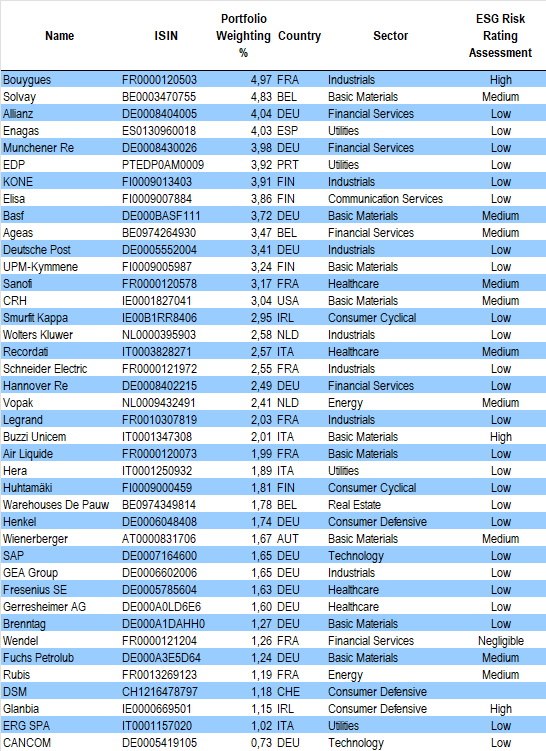
One way to boost your equity income portfolio is to use dedicated indices and exchange-traded funds (ETFs). In this space, a popular index category is the "Dividend Aristocrats".
In Europe, public companies eligible for the index must have a market value of at least $3 billion, an average daily trading volume of at least $5 million, and must have increased their dividends every year for at least 10 consecutive years (20 years in the US, according to S&P Methodology).
All well and good. But ESG investors might wonder if such indices are also compatible with their environmental concerns.
We've looked at the constituents of two ETFs based on the Morningstar Bronze-rated S&P Euro Dividend Aristocrats and the Silver-rated S&P Euro Dividend Aristocrats.
Thanks to our stock intersection analysis in Morningstar Direct, we found both funds have the same underlying assets for at least 78% of their holdings.
The ETF replicating those indices is made of about 40 constituents. On average, those constituents have a low ESG risk, even though some holdings are riskier than others. That’s the case for Bouygues (both indices' largest holdings) as well as Buzzi Unicem and Glanbia.
According to Morningstar Sustainalytics, Bouygues’s "business relations with its value chain drive exposure to bribery and corruption risks". The company’s overall exposure is high and is moderately above subindustry average.
Buzzi Unicem’s "carbon footprint is affected by the nature of its operations and the source of energy used to power these operations," meanwhile.
Glanbia’s "product and service portfolio, as well as its customer base triggers exposure to quality and safety issues", Morningstar Sustainalytics says.
"Types of misconduct include unsafe features, insufficient transparency and misleading marketing", analysts note. On top of that, the company’s carbon footprint "is affected by the nature of its operations and the source of energy used to power these operations."
The indices also include medium-ESG-risk companies like Solvay, BASF, Ageas, Sanofi, CRH and Recordati, among their top 20 holdings.
Nevertheless, most of the companies in the indices are “low-risk” and represent about 62% of the SPDR S&P Euro Dividend ETF, with an average risk 18% lower than the whole ETF.

Source: Morningstar Direct, data as of May 11, 2023







:quality(80)/cloudfront-us-east-1.images.arcpublishing.com/morningstar/6BCTH5O2DVGYHBA4UDPCFNXA7M.png)




















